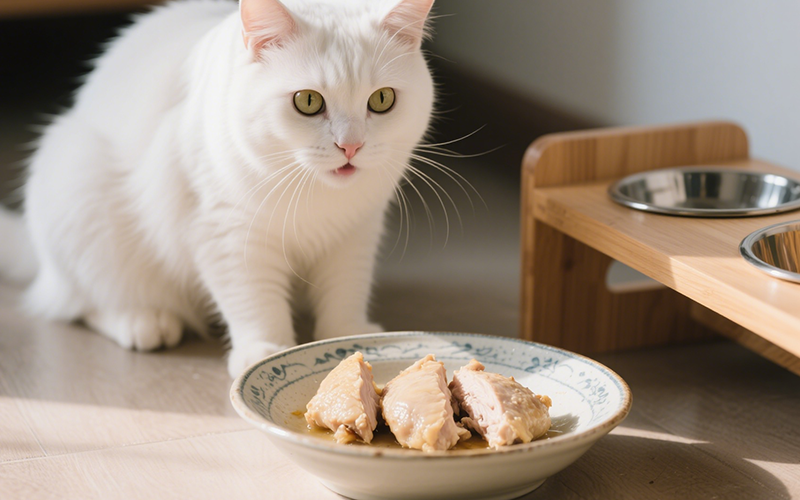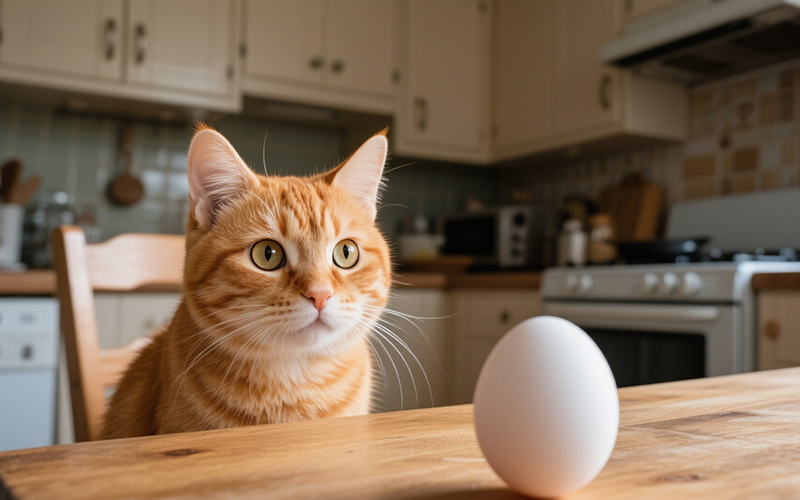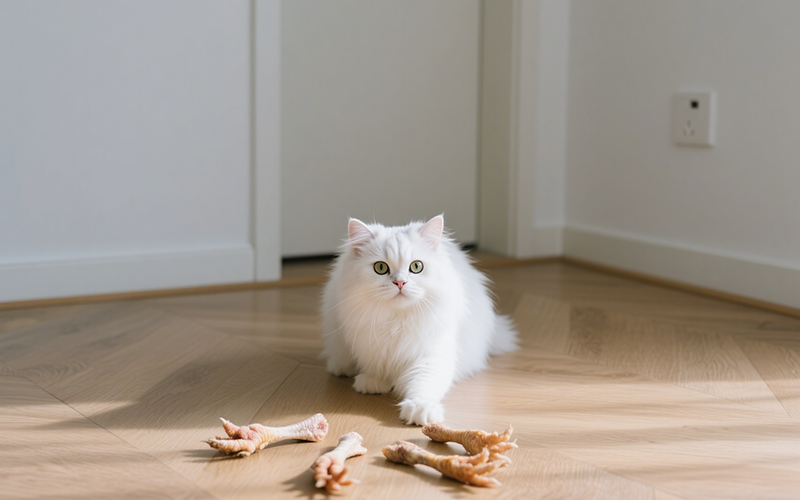Can Cats Eat Cooked Meat? Sizzling Facts for Your Feline's Feast!
- 26 May 2025 13:43
As dedicated cat owners, we're always keen to provide the best nutrition for our furry companions. Given that cats are obligate carnivores, meaning their diet naturally consists almost entirely of meat, a common and important question arises: can cats eat cooked meat? The answer is a resounding YES! Plain, thoroughly cooked meat is not only safe but can also be a highly nutritious and palatable part of your cat's diet, whether as a treat or a supplement to their regular meals. However, "plain" and "thoroughly cooked" are key. This comprehensive guide will explore the benefits, safe preparation methods, and important considerations when offering cooked meat to your feline friend.

The Carnivore Connection: Why Cooked Meat is Great for Cats
Cats have evolved to thrive on a diet rich in animal-based proteins and fats. Cooked meat aligns perfectly with their physiological needs:
| Nutrient/Benefit | Importance for Cats |
| High-Quality Animal Protein | Essential for muscle growth, development, and repair. Supports enzyme and hormone production, immune function, and provides energy. Meat protein is highly digestible for cats. |
| Essential Amino Acids (e.g., Taurine, Arginine) | Cats cannot synthesize certain amino acids like taurine and arginine and MUST obtain them from animal tissues. Deficiencies can lead to severe health problems (e.g., taurine deficiency causes blindness and heart disease). Meat is rich in these. |
| Fats (Animal-Based) | A concentrated energy source. Essential for absorbing fat-soluble vitamins (A, D, E, K), maintaining healthy skin and coat, and providing essential fatty acids. |
| Vitamins (e.g., B Vitamins, Vitamin A) | Meat is a good source of B vitamins (niacin, B6, B12) crucial for energy metabolism and nerve function. Liver (an organ meat) is exceptionally high in Vitamin A (feed liver in moderation). |
| Minerals (e.g., Iron, Zinc, Phosphorus) | Iron for oxygen transport, zinc for immune function, phosphorus for bone health – all readily available in meat. |
| High Palatability | Most cats find the taste and aroma of cooked meat highly appealing, making it an excellent treat or appetite stimulant. |
Given these benefits, it's clear that plain, cooked meat can be a valuable component of a cat's diet.
Safe & Savory: How to Prepare Cooked Meat for Your Cat
The key to safely feeding cooked meat to your cat lies in the preparation. "Plain" and "thoroughly cooked" are the operative words.
Best Practices for Preparation:
Choose Lean Cuts (Generally):
Good options include: boneless, skinless chicken breast or thigh, lean turkey breast, lean cuts of beef (like sirloin or round), lean pork (though some are cautious due to historical parasite concerns, modern pork is generally safe if well-cooked), and lamb.
While cats need fat, excessive fat can lead to digestive upset or contribute to pancreatitis in susceptible individuals. Trimming visible excess fat is a good idea, especially if using fattier cuts.
Cook Thoroughly – NO Raw or Undercooked Meat:
Boiling/Simmering: Cook in plain water until done. The resulting unsalted broth can also be a treat.
Baking/Roasting: Cook plain in the oven without added fats or seasonings.
Steaming: A healthy, fat-free method.
Grilling (Plain): Ensure no charred bits are given, and no sauces or seasonings are used.
Raw or undercooked meat can harbor harmful bacteria like Salmonella, E. coli, and Listeria, which can cause severe food poisoning in cats (and humans handling it).
Cooking meat to a safe internal temperature kills these pathogens. For poultry, aim for 165°F (74°C); for ground meats, 160°F (71°C); and for whole cuts of beef, pork, or lamb, 145°F (63°C) followed by a 3-minute rest time. When in doubt, cook until no pink remains.
Acceptable cooking methods:
Keep it PLAIN – Absolutely No Seasonings, Oils, or Additives:
NO Salt: Cats have a low sodium tolerance.
NO Garlic, Onions, Chives, Leeks (or powders): These are highly toxic to cats and can cause anemia.
NO Spices or Herbs: Many common human seasonings can irritate a cat's stomach or be harmful.
NO Oils, Butter, or Cooking Fats: Added fats are unnecessary and can cause digestive upset or pancreatitis.
NO Sauces, Gravies, or Marinades (human-prepared): These are typically high in salt, sugar, fats, and potentially toxic ingredients.
Remove All Bones:
Choking.
Damage to the mouth, throat, or esophagus.
Perforation of the stomach or intestines (a life-threatening emergency).
Constipation or obstruction.
Cooked bones are extremely dangerous. They become brittle and can splinter easily, causing:
Always use boneless cuts of meat or meticulously remove all bones after cooking and before serving. Double-check for small bone fragments.
Remove Skin (Often Recommended, Especially for Poultry):
Meat skin (e.g., chicken skin) is very high in fat. While a tiny piece of plain cooked skin might not harm a healthy cat occasionally, it's generally best to remove it to keep the treat lean, especially for cats prone to weight gain or pancreatitis.
Cool and Cut/Shred:
Allow the cooked meat to cool completely to prevent burns.
Cut or shred the meat into small, bite-sized pieces appropriate for your cat's size. This makes it easier to eat and reduces the risk of choking.
Adhering to these guidelines ensures that the cooked meat you offer is safe and beneficial.
Integrating Cooked Meat into Your Cat's Diet
While cooked meat is healthy, it shouldn't be the sole component of your cat's diet unless specifically formulated by a veterinary nutritionist.
Serving Ideas and Moderation:
As a Treat: Small pieces of plain cooked meat make excellent high-value treats for training or as a special reward.
Meal Topper/Enhancer: Adding a small amount of shredded cooked meat to your cat's regular commercial food can increase palatability, especially for picky eaters or senior cats with waning appetites.
Temporary Diet for Illness (Vet-Approved): Plain boiled chicken or turkey is often recommended by vets as a bland diet for cats recovering from digestive upset. However, this should only be short-term unless your vet advises otherwise.
Part of a Balanced Home-Cooked Diet: If you wish to feed a home-cooked diet primarily based on cooked meat, it is CRUCIAL to work with a board-certified veterinary nutritionist. They will ensure the diet is complete and balanced with all necessary vitamins, minerals (like calcium, which meat alone is low in), and other nutrients in the correct proportions. Feeding only cooked meat long-term will lead to severe nutritional deficiencies.
The 10% Rule: If using cooked meat as a treat or supplement, it should not constitute more than 10% of your cat's total daily caloric intake. The majority (90%) of their nutrition should come from their complete and balanced commercial cat food.
Introduction:
When first introducing cooked meat, start with small amounts to see how your cat tolerates it. Most cats do very well, but individual sensitivities can occur.
Types of Cooked Meat Suitable for Cats
Many types of plain, cooked meat can be offered:
Chicken (Breast, Thigh): Lean, easily digestible, and often a favorite.
Turkey (Breast): Similar to chicken, a good lean option.
Beef (Lean Cuts like Sirloin, Round): Rich in iron and B vitamins.
Lamb: Can be a good option, especially for cats with allergies to more common proteins, but ensure it's lean.
Pork (Lean Cuts like Loin): Must be thoroughly cooked to eliminate any risk of parasites like Trichinella (though this is rare in commercially raised pork in many countries). Ensure it's lean.
Rabbit: A good novel protein for some cats.
Duck: Richer and fattier than chicken or turkey, so offer in smaller amounts and ensure it's lean.
Organ Meats (Liver, Heart, Gizzards): These are nutritional powerhouses but should be given in moderation.
Liver: Very rich in Vitamin A. Feed sparingly (e.g., a tiny piece once or twice a week) to avoid Vitamin A toxicity (hypervitaminosis A).
Hearts and Gizzards: Excellent sources of protein, taurine, and B vitamins. Can be fed more regularly as part of the treat allowance than liver.
PettureX: Your AI Partner for Feline Food Facts
Navigating pet nutrition can sometimes raise questions. The PettureX app can be a useful AI-powered resource for quick, general information.
PettureX offers:
24/7 AI Consultation: You can ask general questions like "What's the best way to cook chicken for my cat?" or "Are there any meats cats shouldn't eat?" The AI chatbot can provide instant information based on widely accepted veterinary guidelines, always stressing the importance of plain preparation, thorough cooking, and moderation. It will also consistently remind users that for specific dietary plans or if a cat has health issues, consulting a veterinarian is essential.
PettureX can help you quickly access general best practices for feeding your cat, supporting your journey to provide them with safe and healthy nutrition.
Conclusion: Cooked Meat – A Deliciously Safe Choice for Cats
To sum up, can cats eat cooked meat? Yes, absolutely! It aligns perfectly with their carnivorous nature and provides essential nutrients for their health and vitality.
The golden rules for feeding cooked meat to your cat are:
Cook it thoroughly to kill harmful bacteria.
Serve it plain, with no salt, spices, oils, garlic, onions, or other additives.
Ensure it's boneless to prevent choking or internal injury.
Offer it in moderation as a treat or supplement to a complete and balanced diet.
By following these simple yet crucial guidelines, you can safely incorporate various types of cooked meat into your cat's treat rotation or as an enhancer to their regular meals, providing them with a delicious and species-appropriate source of nutrition. Remember, a happy cat often has a healthy diet, and plain cooked meat can certainly contribute to that!
Frequently Asked Questions (FAQs)
Q1: Can cats eat raw meat instead of cooked meat?
A: Feeding raw meat to cats is a controversial topic. While some advocate for it, raw meat carries significant risks of bacterial contamination (Salmonella, E. coli, Listeria) that can sicken cats and be transmitted to humans. It also requires careful balancing to be nutritionally complete. Most veterinarians recommend thoroughly cooking meat to eliminate these risks. If considering a raw diet, consult with a veterinary nutritionist.
Q2: How much cooked meat can I feed my cat daily?
A: If used as a treat, cooked meat should not exceed 10% of your cat's total daily caloric intake. For an average 10-pound cat needing about 200-250 calories a day, this means no more than 20-25 calories from meat treats. A small piece (about the size of your thumb tip or a couple of small dice) might be appropriate. If it's part of a balanced home-cooked diet formulated by a vet nutritionist, the amounts will be specific to the recipe.
Q3: Can kittens eat cooked meat?
A: Yes, kittens can eat plain, thoroughly cooked, boneless meat once they are weaned and eating solid food. It should be finely shredded or minced to make it easy for them to eat. It can be a good source of protein for their growth but must not replace their specially formulated, complete, and balanced kitten food.
Q4: Is it okay to feed my cat fatty cuts of cooked meat?
A: While cats need fat in their diet, too much fat, especially in one go, can lead to digestive upset (vomiting, diarrhea) and potentially trigger pancreatitis in susceptible cats. It's generally best to stick to leaner cuts of meat or trim off visible excess fat. A small amount of fat is fine, but avoid very fatty pieces as regular treats.
Q5: Can cats eat processed meats like ham, bacon, or sausages?
A: No, it's best to avoid processed meats.
Ham and Bacon: Often very high in sodium and fat, and may contain nitrates/nitrites and other preservatives.
Sausages: Frequently contain high fat, salt, spices, and potentially harmful ingredients like onion or garlic powder.
Stick to plain, unprocessed cooked meat that you prepare yourself.
Q6: What if my cat has a sensitive stomach or food allergies?
A: If your cat has a sensitive stomach, plain boiled chicken or turkey is often well-tolerated and can be part of a bland diet. If you suspect food allergies, meat is a common component. An allergy could be to a specific protein (e.g., chicken, beef). If you introduce a new meat and see signs of allergy (itching, skin issues, digestive upset), stop feeding it and consult your vet. They might recommend a novel protein (one your cat hasn't eaten before) or a hydrolyzed protein diet.
Related

Can Cats Eat Egg Yolk Raw? A Vet's In-Depth Guide to Feline Nutrition & Safety
- 10 Jun 2025
Can Cats Eat Dog Kibble? Unpacking the Nutritional Mismatch!
- 29 May 2025
Can Cats Eat Deli Turkey? Slicing Through the Facts for Your Feline!
- 29 May 2025
Can Cats Eat Deer Meat? Exploring Venison for Your Feline!
- 28 May 2025
Can Cats Eat Corned Beef? Unpacking This Salty Human Delicacy!
- 28 May 2025
Can Cats Eat Cooked Rice? The Grain Truth for Your Feline Friend!
- 27 May 2025
Can Cats Eat Cornbread? A Crumb of Truth for Curious Cat Owners!
- 27 May 2025
Can Cats Eat Chili? Spicing Up the Truth About This Human Dish!
- 26 May 2025
Can Cats Eat Chicken Eggs? Cracking the Code on This Feline Food Query!
- 24 May 2025
Can Cats Eat Chicken Feet? A Paw-sitive or Negative Treat?
- 24 May 2025
